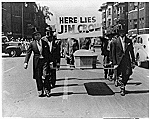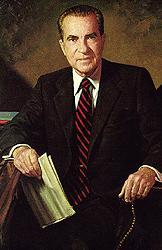Posted on July 17, 2005
Groveling Old Party
"Sorry Strategy" is self-defeating
by
Daniel Clark
One of America's two major political parties has defended slavery, halted Reconstruction, fenced off black convention delegates with chicken wire, filibustered anti-lynching legislation, enforced segregation, and appointed Robert Byrd, a former Exalted Cyclops of the KKK, as President Pro Tempore of the Senate. Incredibly, this is not the same party that is now apologizing for a racist past.

No, it was not Democrat chairman Howard Dean who apologized for his party's "trying to benefit politically from racial polarization." It was his counterpart, Ken Mehlman of the Republican National Committee. To make matters worse, the audience to which Mehlman made this apology was the NAACP, an organization for which benefiting politically from racial polarization is an way of life. After the sleazy TV ad that group ran during the 2000 campaign, accusing George W. Bush of being retroactively complicit in the dragging murder of James Byrd, it ought to be the NAACP apologizing to the Republicans, not the other way around.

To be fair, Mehlman's apology accounted for only a tiny portion of his speech, but that doesn't matter, because he should have known how it would be received. Although he did what would otherwise be considered an effective job in recounting the Republican Party's history of defending black Americans' constitutional rights, contrasting that with the shameful record of the Democrats, and arguing that President Bush's policies are beneficial for blacks, few people will ever know that he said those things, because they weren't reported. All the newspapers took from his address was his vague confession about racial polarization, followed by the statement, "I am here today as the Republican chairman to tell you we were wrong."
What "we" were wrong about, he didn't specify. Odds are, he couldn't spell it out if he tried. Even liberals, who would only be too eager to remind people of Republican civil rights atrocities if they existed, can do little more than complain about the tone of an occasional campaign ad, accuse Republicans of stealthily using racist "code words" (like "let's cut taxes," according to Rep. Charles Rangel), and regurgitate the phrase "Southern Strategy," as if that were all the explanation that was necessary.
One of the most stubborn tales in American political mythology, often pushed by the news media, is that all of the racist Democrats in the South switched parties in the Sixties. From that premise, it follows that the Republicans have inherited the Democrats' legacy, while the Democratic Party has been freed from it. This fiction was breathlessly retold in December of 2002, during the absurdly overblown Trent Lott controversy, when Sen. Strom Thurmond was presented as evidence that the Republicans had become the neo-segregationist party. In reality, Thurmond was the exception that proved the rule. Among the 19 Senators who signed the Southern Manifesto in protest of desegregation, every one of them except Thurmond remained a Democrat for the rest of his political career.
When Democrats fare poorly in the South, they take that as affirmation of their own goodness, as if Southerners were uniformly racist, and as if they were still basing their votes on issues that had already been permanently settled. On those occasions when Democrats succeed in the South, however, that is never taken as a sign that they've done anything wrong. Only Nixon, Reagan and Bush are presumed to have won over Southern voters by implementing some murkily diabolical "Southern Strategy." Carter and Clinton, though they surely won the votes of many of those same voters, are subjected to no similar accusations.
Now, Mehlman is validating this double-standard, by pleading guilty to a nebulous charge that cannot be disproved. Why shouldn't people blame Republicans for the Democrats' past transgressions, if the Democrats won't apologize for them, but the Republicans will?

This is not to say that Democrats don't apologize. It's just that their concept of collective guilt does not extend to their party affiliation. When affixing blame for racial injustices, they're perfectly happy to say that we, as whites, or as Americans, are guilty. But are they, as Democrats, guilty also? Never!

That's why it's Mehlman's job to point out the respective parties' true histories. So what's he doing undercutting that message, by groveling before an organization which itself has become little more than an appendage of the Democratic Party? To be able to guess at an answer to that, we first have to recognize that Mehlman is not the head of the Republican Party in the same way that Dean is the head of the Democrats. Both parties understand that the President of the United States is always the leader of his own party's national committee.
Mehlman may have been the one speaking, but what was heard was just more of President Bush's "new tone" drivel. Bush won't appear before the NAACP, not because he resents what they did, but because he won't risk the bad publicity of the audience's response to him. So instead, he sends the RNC chairman to try to patch things up, by saying he's sorry for something or other.
How many times have we seen this story before? The Republicans extend an olive branch to their opponents, who proceed to thrash the daylights out of them with it, and then the media blame them for instigating the altercation. By next year's congressional elections, the Democrats will have taken Mehlman's "we were wrong" statement, and interpreted it as an admission to whatever crackpot suspicions Al Sharpton, Maxine Waters and Mary Frances Berry can dream up. How can the Republicans deny the next round of bogus accusations of voter intimidation, when in the minds of most of the media, their chairman has already admitted that they've done that sort of thing? Sure, there won't be any evidence, but no evidence was required to support Mehlman's apology, either. Hence, according to Democrat logic, an absence of evidence indicates guilt.
This just goes to show that the Democrats are not the only ones in denial of their party's history, because the Republicans can't even remember events from three years ago. If they could, they'd recall that Trent Lott's week-long sorrython did him no good at all. Even the ridiculous apology recently issued by the BTK killer was more warmly received by the press than any apology from a Republican could ever be.
After years of media bellyaching that President Bush was too stubborn to apologize, he inexplicably retracted the statement from his 2003 State of the Union Address, in which he pointed out that British intelligence said that Saddam Hussein had tried to buy uranium from Africa. Although the statement was absolutely accurate, it had become a source of controversy, which the administration tried to quell by conceding that it should not have been included in the address.
According to this ill-conceived approach, which should heretofore be known as the Sorry Strategy, the retraction of the somehow infamous "16 words" should have elicited sympathy. How big of him, the president's detractors were supposed to think, that he's willing to admit that he was wrong. Why, he really is a uniter and not a divider. Now that he's taken the first step, maybe we should reach out to meet him halfway, and make nice.

As it should be needless to point out, that's not how things unfolded. Instead, the Democrats and therefore the media accepted the vague admission as evidence that President Bush had lied. The validity of his statement was by this point irrelevant, because what was perceived as a confession had already been made.
Having learned nothing from that debacle, the Republicans have reverted to their Sorry Strategy in a vain attempt to gain concessions in return from the NAACP. The next day's predictable USA Today headline tells us just how well that went. "GOP: 'We were wrong' to play racial politics." Nowhere in the article is it reported that Mehlman slammed the Democrats as "the party of Jim Crow." It does state, however, that his speech was "the first time a top Republican Party leader has denounced the so-called Southern Strategy employed by Richard Nixon and other Republicans to peel away white voters in what was then the heavily Democratic South."

That's an interesting conclusion to draw, since Mehlman never mentioned anything about a Southern Strategy, or said anything critical of Richard Nixon during his address to the NAACP. But then, his lack of an explanation left a blank for reporters to fill in, which they gladly did, with their usual assumptions.
There can be little doubt that variations of Mehlman's quote will be appearing in the headlines of Democrat newsletters in the next election cycle. What will follow will be questions of what the Republicans are doing to rectify those past wrongs, whatever they were. Since they're leaving it up to their enemies to decide what it is to which they've confessed, any proposed remedy is bound to be too unreasonable to entertain. The conclusion from this will be that the Republicans admit to using racist tactics, and are determined to continue doing so.
Whatever its merits are believed to be, the Sorry Strategy is little more than an invitation to abuse. When Mehlman uttered the words, "we were wrong," he did the rhetorical equivalent of taping a "kick me" sign to the back of every Republican candidate running in next year's elections.
As long as the Republicans are lending credibility to the Democrats' caricatures of them, they might as well go all the way, by apologizing for taking away old people's Social Security, forcing them to eat cat food, and throwing them out in the snow to die. If they did that, they may never win another election again, but at least they could hold out hope that -- contrary to past experience -- it might make liberals like them. And isn't that what's really important?
The Shinbone: The Frontier of the Free Press
Mailbag . Issue Index . Politimals